Shahidul Alam Photo Kathmandu award

Shahidul Alam, the acclaimed Bangladeshi photographer, activist and prisoner of conscience was awarded the Photo Kathmandu Award of Excellence at Patan Museum on Friday.
He was detained and arrested by the Bangladeshi government on 5 August 2018 for 'disseminating false, confusing and provocative statements that caused a deterioration in the law and order situation of the state, hurt the image of the state and hurt the sentiment of young students that instigated them to create social instability and engage in destructive activities' through a Facebook live video.
Alam has been in incarceration without hope of bail for the past 82 days. However, it has been widely acknowledged that Alam’s documentation of the protests and his frank interview on Al Jazeera, critical of the Awami League government’s lack of action, are what motivated the Hasina-Wazed government to pursue prolonged detention for one of the father-figures of Southasian photography.

Kanak Mani Dixit, founder of Himal Southasian, who traveled to Dhaka recently, said at the event that Alam’s imprisonment is part of Prime Minister Hasina Wazed’s vindictive agenda to instill fear in social activists across the country before the state elections in December 2018. Coming at this crucial time, this prestigious award stands as a testimony against the silencing of one of Southasia’s most prominent photojournalists.
The award acknowledges Alam’s “'instrumental contribution towards the development of Nepali photography and journalism', and his role as an enabler of Photo Kathmandu. The jury made up of Bikas Rauniar (senior Nepali photojournalist), Bikas Karki (President of Photojournalists Club Nepal and Photo Editor of Annapurna Post) and Sagar Shrestha (President of National Forum of Photojournalists), said the decision was unanimous.
Alam is a renowned institution builder in the photography community recognised for founding Pathshala Southasian Media Institute, Chobi Mela International Festival of Photography, Majority World and the Drik Picture Library. The school, festival, agency and archive combined have been foundational to the development of photographic artists across the subcontinent. These novel initiatives have also contributed to giving photographers from the global south their rightful place as equals in the international media, an industry notorious for its Western bias. Alam has traveled the world demanding fair pay, fair representation, and fair access. This is why Nobel Laureates as prominent as Amartya Sen and Archbishop Desmond Tutu have been demanding his unconditional release.
But how did a Bangladeshi make such a deep impact in Nepal? In a short video made for the occasion, several generations of Nepali journalists and photographers spoke about the immense impact Alam had on their personal and professional development. Bikas Rauniar remembered when Alam succeeded in bringing the World Press Photo exhibition to Kathmandu in September 2002. This was a difficult feat because such an expensive international show had never been accessible to a Nepali public before. Several others like Uma Bista and Arpan Shrestha spoke about the critical educational opportunities and occasions for international exposure that Alam provided.
Nayantara Gurung Kakshapati, co-founder of Photo Kathmandu, met Alam in 2007, at the opening of 'A People’s War', a photobook trilogy launched at the end of the Maoist War. Alam has taught her that working in countries where resource crunches and political pressures were inevitable requires courage, persistence, kindness and passion. Their dialogue has continued over a decade and during this time Photo Circle, the festival’s parent organisation that has been active for over eleven years, has imbibed much of its ethos through Alam’s examples. The way in which their exhibitions blend into the city through nurturing neighborhood participation and discussion is a key tenet of Chobi Mela, the region’s first festival of photography founded by Alam.
In his absence, Gurung Kakshapati invited Alam’s students, colleagues and supporters on stage to accept the award. The 35 people who walked forward represented a cross-section of Nepali, Indian and Bangladeshi artists. Holding masks of Alam’s face over their faces, they stood together in silence. The collective solidarity visible in this moment was indicative of the depth of Alam’s influence.

Munem Wasif, an artist and longtime-colleague of Alam, said a few words on behalf of the Bangladeshi community when Gurung Kakshapati presented the award. Choking with emotion at having to fill the shoes of his mentor, Wasif spoke of the many lessons he had learned: “This year marks 30 years of Drik, and 20 years of Pathshala and Chobi Mela. There are many people like me who have grown up with these institutions… and showed how to see beyond ourselves. Shahidul taught us how to be rooted while also having global ambitions”.
Alam is also a prolific writer and penned these lines: 'There is no government I know that does not champion democracy and human rights in its rhetoric but also actively suppress both in its practice. It’s best to recognise that reality and work within it rather than fantasise on some ideal solution that has no relevance to everyday art practice. So we use the tactics of judo wrestlers, using the opponent’s weight and turning it to our advantage. We use fulcrums and gravity and capitalise on the inherent inertia of the establishment. We are nimble and fleeting. As Ali might have done, we flit like the butterfly and sting like the bee.'
Alisha Settled is co-founder of Kashmir Photo Collective and Deputy Course Director for Critical Theory, Aesthetics and Practice at Jnanapravaha, Mumbai.

Read also:
The death of democracy, Aditya Adhikari
Photo returns to Kathmandu, Monika Deupala




